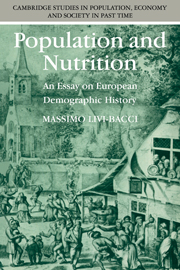Book contents
- Frontmatter
- Contents
- List of figures
- List of tables
- Preface
- 1 Demographic growth in Europe
- 2 Energy, nutrition and survival
- 3 Famine and want
- 4 The starving and the well-fed
- 5 Food and standard of living: hypotheses and controversies
- 6 Antagonism and adaptation
- Notes
- General index
- Cambridge Studies in Population, Economy and Society in Past Time
2 - Energy, nutrition and survival
Published online by Cambridge University Press: 20 October 2009
- Frontmatter
- Contents
- List of figures
- List of tables
- Preface
- 1 Demographic growth in Europe
- 2 Energy, nutrition and survival
- 3 Famine and want
- 4 The starving and the well-fed
- 5 Food and standard of living: hypotheses and controversies
- 6 Antagonism and adaptation
- Notes
- General index
- Cambridge Studies in Population, Economy and Society in Past Time
Summary
Nutritional requirements
Any discussion of the relationship between survival and nutrition calls for knowledge of certain basic principles, principles which are familiar to anyone dealing with the field of nutrition, but not well known to non-specialists. We must be able to answer the following question: what are, quantitatively and qualitatively, both the basic and the ideal nutritional requirements for survival of the human body? For all its sophistication, this is a question which continues to confound nutritional science. In order to function and therefore survive, the human body needs energy, and this energy is supplied by food. In these pages we shall first discuss human energy requirements and their measurement, and then consider the composition of these requirements in terms of the nutrients essential to healthy survival.
In order that an organism remain healthy it must receive sufficient energy to carry out its normal metabolic functions: to support the processes of growth; to sustain physical activity; to maintain body temperature. Pregnancy and breast-feeding require an additional supplement of energy, just as convalescence after an illness does. Energy requirements vary therefore with age and sex, body weight, state of health, level of physical activity and environmental temperature. In a healthy adult, the intake of energy must equal its expenditure to avoid a wasting of the body tissues caused by calorie deficiency, or an accumulation of fat in the opposite case.
- Type
- Chapter
- Information
- Population and NutritionAn Essay on European Demographic History, pp. 23 - 39Publisher: Cambridge University PressPrint publication year: 1991

